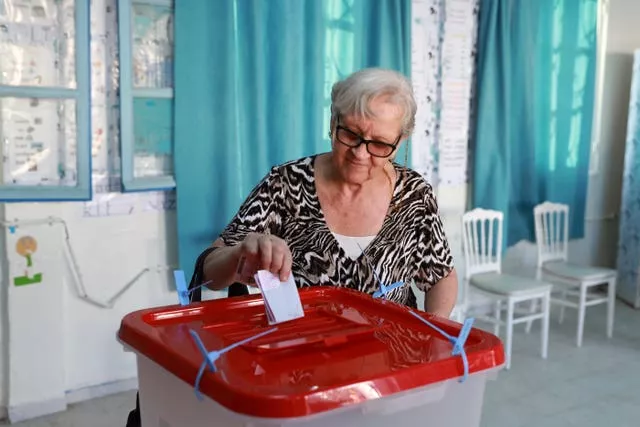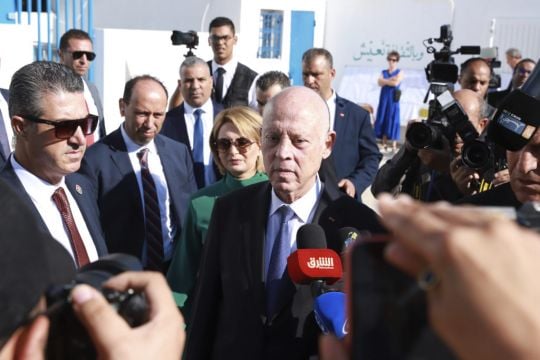Tunisia’s incumbent president said he would wait for official results before declaring victory despite exit polls showing him winning by a landslide in an election marred by earlier arrests of his opponents.
President Kais Saied’s supporters jubilantly honked and celebrated after voting ended and public television broadcast images of the president pledging to pursue traitors and those acting against Tunisia, much like he has throughout his tenure.
“We’re going to cleanse the country of all the corrupt and schemers,” Mr Saied said at his campaign headquarters.
Tunisia’s public television broadcast exit polls from Sigma Conseil, an independent firm that has historically published figures not far off official tallies, showing Saied winning more than 89% of the vote over imprisoned businessman Ayachi Zammel and Zouhair Maghzaoui, a leftist who supported Mr Saied before choosing to run against him.

Much of the opposition chose to boycott the election. They called it a sham with the president’s leading critics imprisoned alongside journalists, lawyers, activists and leading civil society figures. They emphasised the low voter turnout in Sunday’s election.
Official results are expected on Monday.
At the time polling stations closed, only 2.7 million voters, 27.7% of the electorate, had cast ballots — far fewer than the 49% who participated in the first round of the last presidential race in 2019.
Supporters of the president — who rode anti-establishment backlash to win a first term five years ago — said his second win would send a clear message to the political class that preceded his ascendance.
The election was Tunisia’s third since the nation became known as the birthplace of the Arab Spring uprisings that toppled dictators throughout the region.
Weeks after a fruit vendor set himself ablaze to protest police humiliation and corruption, president Zine El Abidine Ben Ali abdicated and fled the country.

In the years that followed, Tunisia enshrined a new democratic constitution, created a Truth and Dignity Commission to bring justice to citizens tortured under the former regime and saw its leading civil society groups win the Nobel Peace Prize for brokering political compromise.
But its new leaders were unable to buoy its struggling economy and quickly became unpopular amid constant political infighting and episodes of violence and terrorism.
Observers judged the country’s first two post-Arab Spring elections as free and fair. However, the lead-up to this year’s race saw the arrests of several declared challengers and the ongoing incarceration of his most prominent right-wing and Islamist critics.
Dozens of candidates had expressed interest in challenging the president and 17 submitted preliminary paperwork to run in Sunday’s race.
Members of the election commission, all of whom are appointed by the president, approved only the three. Mr Zammel was subsequently charged with violating election laws and sentenced to years behind bars.
The president’s detractors have routinely staged protests since July 2021, when he used emergency powers to suspend parliament and later rewrote the constitution giving himself more power.
Since then, dozens of his opponents have been imprisoned on charges including inciting disorder, undermining state security and violating a controversial anti-fake news law that critics say is used to stifle dissent.
Among the changes enshrined in Mr Saied’s constitution, which voters approved via referendum the following year, was allowing the president to appoint all members of Tunisia’s election authority, ISIE. It has faced scrutiny this year for ignoring court rulings ordering it to put candidates it rejected back on the ballot and denying election monitors permission to observe the polls.







